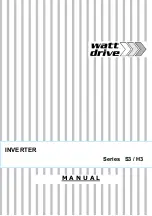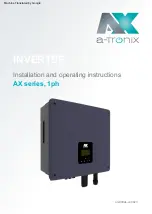
V5 series inverter
73
4-2-6. Protection function parameters (Group P5)
P5.00
Motor overload protection mode selection
Range: 0,1
0
This parameter defines the protection mode when overload or overheat occurs.
0: Inverter locks the output
. When overload or overheat occurs, inverter will lock output and the motor will free stop.
1: Disabled.
Motor has no overload protection. (Be careful to use)
P5.01
Motor overload protection coefficient
Range: 20(%) ~120(%)
100(%)
This parmeter is used to set sensitivity of thermal relay protection for inverter load motor. When the output current value of
load motor can not match the rated current of the inverter,the motor can be thermal protected, as shown in Fig.4-30.
Use the following coefficient to calculate.
[P5.01] =
×
100
Fig.4-30 Thermal relay protection
Note:
When one inverter run with multi-motors, inverter’s thermal relay protection will be disabled. Therefore, please install
thermal relay in the input wire of each motor to protect motor more efficiently.
P5.02
Over-voltage speed loss selection
Range: 0, 1
1
P5.03
Speed loss overvoltage point
Range: 380V: 120~150 (%)
220V: 110~130 (%)
140(%)
120(%)
0: disable
1: enable
During deceleration, the motor’s decelerate rate may be lower than that of inverter’s output frequency due to the load iner-
tia. At this time, the motor will feedback the energy to the inverter, it will cause the inverter DC bus voltage too high. If no
measures are taken, the inverter will be overvoltage protected.
During the deceleration, the inverter detects the bus voltage and compares it with the speed loss over voltage point defined
by P5.03. If the bus voltage exceeds the speed loss overvoltage point, the inverter output frequency will not decrease.
When the bus voltage is lower than the point again, it continues to decelerate run, as shown in Fig.4-31.
Motor rated current
Inverter rated output current
















































